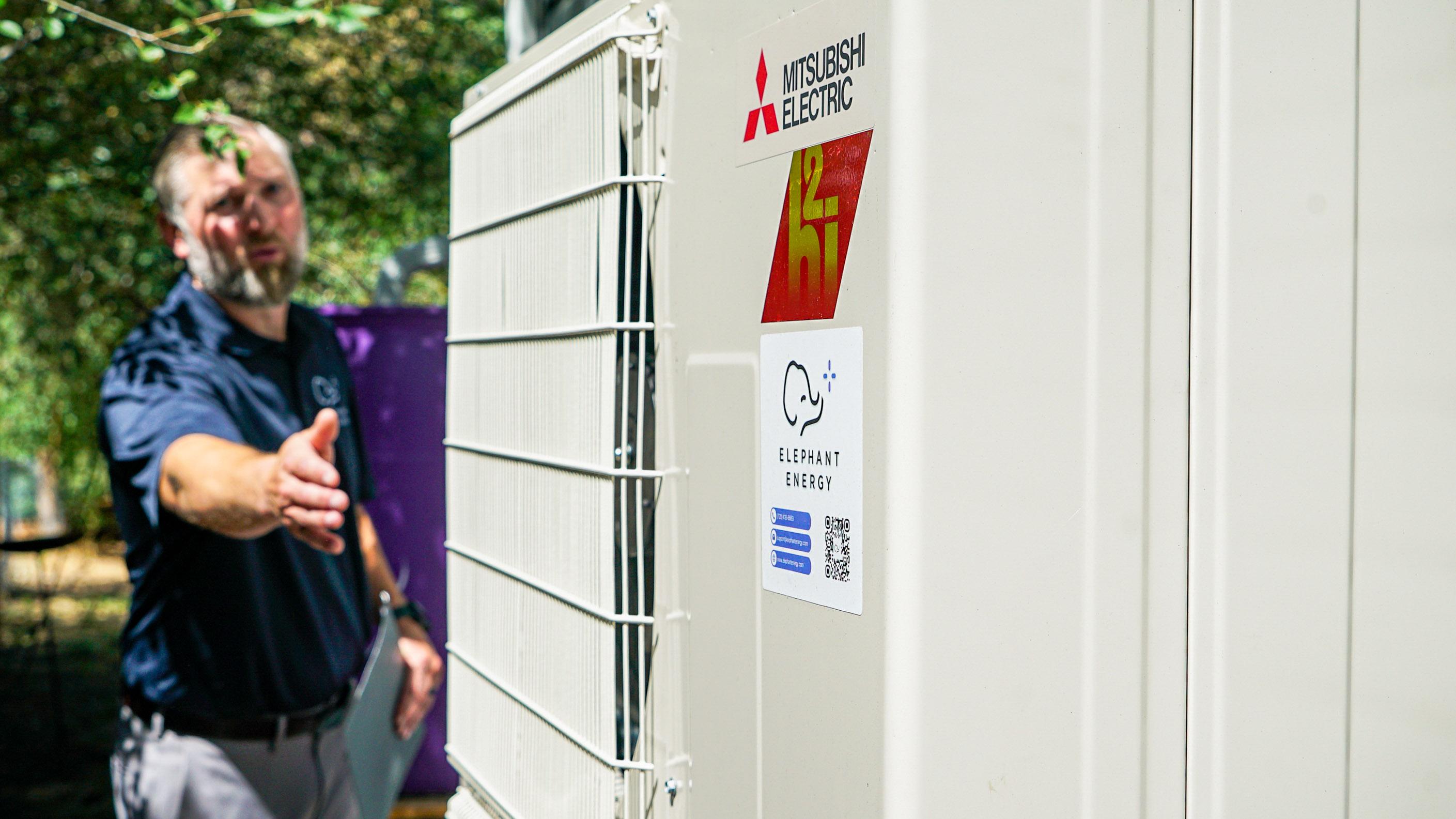
Since it was built in the 1950s, James Warren and Hayley Schroeder’s house in west Denver has relied on fossil fuels to warm its residents each winter.
A recently installed Mitsubishi heat pump will now let the couple use electricity instead to heat and cool their home. While that might sound like a small addition, Gov. Jared Polis and other public officials packed their front porch for a “ribbon cutting” to celebrate the home improvement project on Tuesday.
“This is something we’ve been really excited about,” Warren said. “It’s cool to feel like we’re part of a movement toward cleaner technologies.”
The fanfare is part of a nationwide campaign to celebrate the second anniversary of the Inflation Reduction Act, the signature health care and climate law signed by President Biden in 2022. While the U.S. has offered tax benefits for solar panels and energy efficiency projects for years, the law expanded and extended the benefits starting last year.
Warren and Haley are among nearly 66,000 Colorado households that used the tax credits in 2023, according to new data from the Treasury Department.
“These investments are truly unleashing a clean energy boom,” Polis said at the event. “They’re supercharging Colorado’s climate action, as well as for our region and for our nation.”
Across the country, more than 3.4 million households claimed roughly $8 billion in credits — more than twice congressional projections — to offset the cost of solar panels, all-electric heat pumps, extra insulation or other projects designed to make homes more efficient and climate-friendly.
Warren and Schroeder still use natural gas for cooking and their water heater, but they hope to save enough over the next few years to swap those out. Heat pump systems in cold climates like Colorado’s typically cost between $9,000 and $24,000, according to estimates from the National Renewable Energy Laboratory. The couple said their system cost about $13,000 after federal, local and utility incentives.
Heat pumps move heat from one area to another, shifting it outside to cool a home in the summer, and bringing it inside to warm a home in the winter. Crucially, they can be powered by an electrical grid that increasingly relies on renewable energy sources instead of fossil fuels.
One added perk, Warren said: The couple’s four guinea pigs seemed “very excited and energetic” about the new blast of cool air circulating in the house since the heat pump came online.
The Inflation Reduction Act was originally expected to invest at least $370 billion in clean energy projects. Since those tax credits are proving more popular than anticipated, the final total will likely be higher.
Those expanded incentives, however, are only one portion of the law meant to help residents cut planet-warming emissions at home.
The 2022 act also includes nearly $9 billion in federal funding for rebates to help households pay for climate and energy efficiency projects. Nearly half is exclusively for low-income households. Unlike the tax credits, the upcoming rebates will be available at the point of purchase, so customers won't need to wait until tax season to take advantage of the federal program.
State and tribal governments are responsible for distributing those rebates through their own programs, which must be approved by the U.S. Department of Energy. Colorado has applied for the program, but, so far, only New York and Wisconsin are currently offering discounts for their residents.
Colorado submitted its first application in March 2024, and the state is still waiting for the federal government to sign off on more than $140 million in funding. The Colorado Energy Office expects approval from the U.S. Department of Energy this fall, and is planning to launch the state-wide rebate program this winter, said spokesperson Ari Rosenblum.
“In addition to federal tax credits and state, local, and utility incentives, the upcoming IRA-funded home energy rebate programs will make energy efficiency upgrades and electric appliances more affordable and accessible to income-qualified Coloradans,” Rosenblum said in a statement emailed to CPR News.
Under Colorado’s current plan, households earning less than 150 percent of the area median income will qualify for the rebates, and households earning less than 80 percent of the median income can earn more generous discounts. For example, the program could offset the cost of an electric heat pump by up to $8,000.
At the local level, Denver offers consumers rebates on heat pumps at the point of sale, as long as contractors submit the paperwork. Nearly 500 heat pumps have been installed in residential properties using the program in 2024 so far, according to Mac Prather, a Residential Energy Efficiency Administrator with the city.
Last month, the Denver Regional Council of Governments received nearly $200 million in federal funding from the federal inflation reduction law to reduce carbon emissions, including by offering incentives for electrical appliances. More than $93 million of that will go towards low-income households in the Denver metro area to electrify and weatherize homes, according to Elizabeth Babcock, executive director of Denver’s Office of Climate Action, Sustainability and Resiliency.
Another Coloradan invited to speak at the ribbon-cutting event at the Denver home, Alex “Coach Ace” Acevedo, showed off his Ford F-150 Lightning, and spoke with pride about using state and federal incentives to buy the full-size electric truck, which he bragged was powered by “mother nature.”
When the event ended, Acevedo had to honk to get out of the driveway. The electric truck was too quiet for the remaining crowd to notice.









